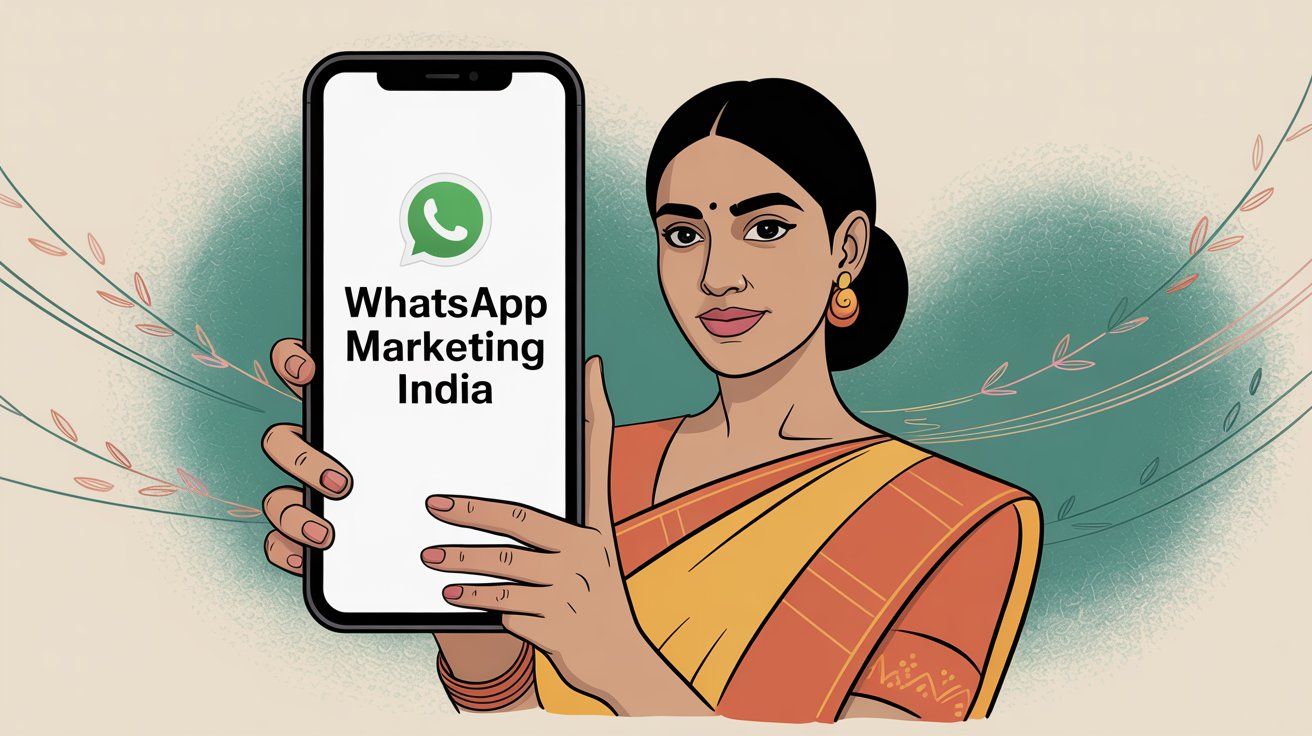
WhatsApp Marketing in India: Ultimate Guide (2025)
Discuss with AI
Get instant insights and ask questions about this topic with AI assistants.
💡 Pro tip: All options include context about this blog post. Feel free to modify the prompt to ask more specific questions!
TL;DR: WhatsApp isn't just India's favorite messaging app (it reaches 600M+ users). It's become the highest-converting marketing channel for Indian businesses, with 90-98% open rates crushing email's 20%. Indian brands using WhatsApp marketing automation see 89% more purchases per user than traditional channels. This guide shows you exactly how to capture that opportunity.
India might as well rename WhatsApp to "the national chat app." With over 600 million active users (the world's largest market), WhatsApp has become as essential as texting or phone calls. More than 80% of Indian internet users check WhatsApp daily for everything from family chats to business updates.
For marketers, this creates an unprecedented opportunity. While your competitors chase email open rates and pray their ads get noticed, you can reach customers where they already spend hours each day.
Here's what makes this channel different: people trust WhatsApp messages. They arrive in the same thread as conversations with friends and family. That personal context drives response rates traditional marketing can only dream about.
This guide breaks down everything you need to know about WhatsApp marketing in India. You'll learn why it works so well here, how to set it up correctly, what strategies actually convert, and how Indian brands are achieving returns that seem too good to be true (but aren't).
WhatsApp controls roughly 83% of India's social messaging market. That penetration is staggering. From tier-1 cities to rural towns, from Gen Z to their grandparents, almost everyone with a smartphone uses WhatsApp.
This isn't like building an audience on a new platform. Your customers are already there, chatting every day. You just need to give them a reason to connect with your business.
Email open rates average around 20%. WhatsApp? Try 90-98% open rates.
That's not a typo. Nearly everyone who receives your WhatsApp message will see it. And because it's a two-way channel, they can reply instantly with questions, objections, or purchase intent.
Traditional marketing is a monologue. WhatsApp is a conversation. And conversations sell.

One D2C brand sent a WhatsApp broadcast promotion and achieved 73x ROI on their spend. That's the kind of return that makes CFOs pay attention.
Research shows WhatsApp drives 89% higher purchases per user compared to other marketing channels. The personal, immediate nature of WhatsApp creates confidence. Customers feel like they're chatting with a trusted advisor, not being sold to.
India skipped the desktop era. Millions went straight from feature phones to smartphones, and they live on mobile. WhatsApp was built for this reality.
It works on budget smartphones. It uses minimal data. You can send images, videos, voice notes, and PDFs without asking users to visit a website. Features like quick-reply buttons and list menus make browsing and buying as simple as tapping.
Customers can discover products, ask questions, and complete purchases right inside the chat. That frictionless experience is crucial in a market where simpler always wins.
Unlike promotional emails that scream "marketing," WhatsApp messages feel personal. They arrive alongside chats from friends and family, creating an atmosphere of trust before users even read your message.
Indian consumers (rightfully) ignore overly formal or obviously automated communications. But a friendly WhatsApp message addressing them by name, written in their preferred language, offering something genuinely useful? That gets attention.
The bottom line: WhatsApp combines reach, attention, and interactivity in a way no other channel can match in India. You meet customers where they already are (on their phones, chatting) instead of hoping they check an email or see an ad.
If you're new to WhatsApp marketing, understanding the two main options is crucial: the free WhatsApp Business App and the WhatsApp Business API.
Here's the decision at a glance:
Feature | Business App (Free) | Business API |
|---|---|---|
Best For | Very small local businesses | Serious marketing at scale |
User Access | One phone, one person | Multi-agent teams, web-based |
Broadcast Limit | 256 contacts max | Unlimited (with approved templates) |
Automation | None | Full chatbots & AI agents |
Integrations | None | CRM, e-commerce, analytics |
Cost | Free | Platform fee + per-message charges |
Verification Badge | No | Yes (Blue Tick available) |
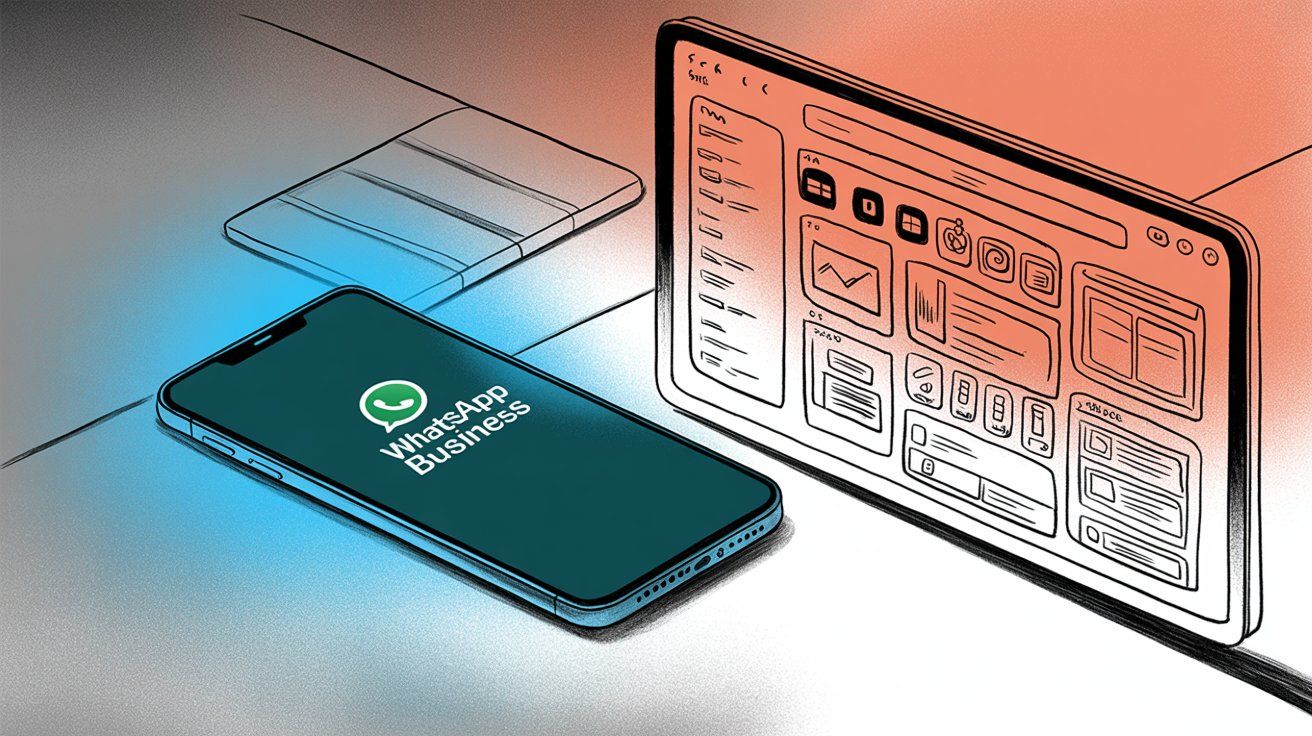
This free mobile app works fine for tiny operations. You get a business profile, quick replies, labels to organize chats, and broadcast lists that can message up to 256 contacts.
A local boutique might use it to send new product photos to regular customers. It's simple. You just need a smartphone.
The limitations hit fast:
• Broadcasts only reach contacts who've saved your number
• Maximum 256 recipients per broadcast list
• No CRM integration or advanced automation
• One user, one phone (no team access)
• Zero chatbot capabilities
• Risk of getting blocked if you try scaling
The Business App works for neighborhood shops doing manual outreach. For any serious marketing (campaigns, automation, scale), it's a dead end.
The API is built for businesses that need to engage hundreds or thousands of customers professionally. There's no standalone interface. You access it through authorized platforms like Spur, which provide the tools and infrastructure.
These platforms give you dashboards to manage conversations, send broadcasts, build chatbots, and integrate with other software.
What the API unlocks:
1. Mass Messaging with Approved Templates
Send bulk messages to thousands of users simultaneously using approved message templates. For promotional broadcasts, you create a template like:
"Hi {name}, our Diwali sale is live! Get up to 50% off. Shop now: {link}"
Submit it to WhatsApp for approval under the "Marketing" category, then blast away. Templates ensure you're following guidelines and not spamming.
2. Automation & AI Chatbots
Set up AI-powered chatbots to greet users, qualify queries (sales vs. support), check order status, or make product recommendations. Indian businesses are crushing it with this.
One brand's AI bot resolved 93% of "Where is my order?" queries automatically. That's 24/7 customer service without lifting a finger.
3. Multi-Agent Team Access
The API isn't tied to one phone. You get a web-based inbox where multiple team members handle incoming chats simultaneously. Sales and support can collaborate with shared conversation history, assign tickets, and ensure nobody gets ignored.
4. Deep Integrations
Connect WhatsApp to your CRM, e-commerce platform, payment gateway, analytics tools. If you use Shopify or WooCommerce, order confirmations and abandoned cart messages can trigger automatically.
Spur's Shopify integration syncs with your store to send personalized campaigns based on purchase history. Data flows both ways, so you can segment contacts intelligently and trigger flows based on customer actions.
5. Verified Business Account (Blue Tick)
Using the API lets you apply for WhatsApp's verified blue tick badge. That blue tick boosts trust instantly. Even without verification, API accounts display your business name (even to users who haven't saved your number).
6. Analytics and Optimization
Track delivery rates, read metrics, response times, campaign performance. Some platforms like Spur offer Delivery Boost features that optimize message routing to improve deliverability.
The API isn't free like the Business App. You'll pay a platform fee (Spur's plans start around ₹3,000/month for basic tiers) plus WhatsApp's per-conversation charges.
As of 2025, a business-initiated marketing conversation in India costs approximately $0.017 (₹1.4). If a customer messages you first, it's often categorized as a service conversation (frequently free on most plans).
That's a fraction of a rupee per outreach. Given WhatsApp's conversion rates, the ROI justifies the cost easily.
Business App: Only if you're an individual or micro-business doing manual, local outreach.
API Platform: For anyone serious about marketing at scale. Broadcasts, campaigns, automation, professional customer experience. All require the API.
The good news? Platforms like Spur have made the API accessible with user-friendly visual automation builders and no-code interfaces. You don't need to be a developer anymore.
Building a successful WhatsApp marketing operation comes down to four key components: audience building → message creation → automation → engagement. Let's break down each one.
You can't just blast WhatsApp messages to random contacts. That violates WhatsApp's policies and destroys trust. You need users to want to hear from you.
Website & App Integration
Add a prominent "Subscribe on WhatsApp" button or banner. When clicked, it opens WhatsApp with a preset message. Sweeten the deal with an incentive:
"Get ₹100 off your first order when you join our WhatsApp updates"
Explain what they'll receive ("exclusive deals, order alerts, no spam"). Transparency builds trust.
Social Media Links
Put your WhatsApp link in your Instagram bio, Facebook CTA button, YouTube descriptions. Given WhatsApp's ubiquity, users will engage if invited. You can generate these links easily with Spur's WhatsApp link generator tool.
Click-to-WhatsApp Ads (Game Changer)
Facebook and Instagram ads can trigger WhatsApp chats instead of website visits. Someone taps "Message on WhatsApp," and boom (they're chatting with your business).
You engage leads while interest is hot, and you get their phone number automatically. These Click-to-WhatsApp ads significantly boost conversion rates because you can answer questions instantly.
In-Store & Offline
Print WhatsApp QR codes on flyers, posters, packaging, checkout counters. A retailer might display: "Scan for VIP WhatsApp updates (new arrivals & sale previews)."
People scan, send a pre-filled message, and you've got another subscriber. This works brilliantly in India's retail-heavy market. Use Spur's QR code generator to create these codes instantly.
Sign-Up & Checkout
When collecting phone numbers during registration or purchase, ask: "✔ Yes, send me order updates and offers on WhatsApp."
Most Indians prefer WhatsApp over email for transactional messages. Given the choice, they'll opt in. Just be clear in your privacy policy about what they're agreeing to (India's data protection law requires explicit consent).
Quality Beats Quantity
Never buy contact lists or add people without permission. WhatsApp users report spam aggressively, and Meta will flag your number fast.
Better to have 1,000 engaged subscribers than 50,000 who never agreed and will ignore or report you.
WhatsApp isn't bulk SMS. You have rich media, interactivity, and high user expectations. Here's how to meet them:
Write Like a Human
WhatsApp is personal. Skip the corporate speak. Use a warm, conversational tone:
❌ "Dear Customer, we are offering a 20% discount on our products for a limited time."
✅ "Hi {{name}}! 👋 We thought you'd like this (extra 20% off our new collection, today only! Tap to check it out."
Emojis work (sparingly, if they fit your brand). In India, mixing in Hinglish or local language can resonate powerfully.
Personalize Everything You Can
At minimum, use their name. But go deeper: segment by customer type, purchase history, interests.
A fashion retailer sends different blasts to "shoe lovers" vs. "apparel shoppers" with relevant images. One Indian pet care brand sent personalized product recommendations and generated ₹1 million in sales in 3 months, with roughly 35% of WhatsApp conversations converting.
Personalization transforms generic spam into helpful suggestions.
Use Rich Media Strategically
WhatsApp supports images, videos, GIFs, audio, documents. Use them.
• Product photos or short video demos (15-30 seconds)
• Voice notes from founders (personal touch)
• Carousels for showcasing collections
Visual content crosses language barriers and captures attention fast. A jewelry store might send a beautiful carousel of a new collection, followed by a 10-second video of a model wearing one piece.
Businesses mixing media types see better engagement.
Interactive Elements Are Gold
WhatsApp's API supports quick-reply buttons and list menus. These make engagement effortless.
Send a template asking: "👕 Looking for something specific?" with buttons like:
• Browse new arrivals
• Track my order
• Talk to support
Or during a promotion: "Claim your discount now" with a CTA button opening your site.
Lists let users choose from menus (great for restaurants or catalogs). WhatsApp's interactive features make engagement simple and seamless. They transform passive messages into mini-conversations.
Clear Call-to-Action
Every message should drive a specific next step:
• Click to shop
• RSVP for an event
• Use this coupon code
• Reply with 👍 if you want a quote
Make the action obvious. Include direct links. Or ask a question to start dialogue:
"We're launching new sneakers. Curious? Ask me about sizes or prices and I'll get right back to you!"
Engagement leads to conversion. Make starting that engagement dead simple.
Keep It Brief & Time It Right
One or two short paragraphs max. People skim on mobile. Hook them early with the value ("Get 50% off…"), then provide details or a link.
Timing matters. Messages during working hours might get buried. Evenings or weekends often see better B2C engagement in India. Avoid late night or early morning (it's intrusive).
Frequency matters too. Users might tolerate a few messages per week from brands they love. Spam them daily and they'll mute or block. Reserve WhatsApp for your most valuable updates (major sales, back-in-stock alerts).
Quality over quantity, always.
Manual chatting doesn't scale beyond a handful of conversations. Automation ensures you can handle thousands of WhatsApp interactions without sacrificing personalization.
Chatbots for Instant 24/7 Response
Indian consumers expect replies within minutes on WhatsApp. Humans can't always deliver that. Bots can.
At minimum, set up an auto-reply acknowledging every message: "Thanks for reaching out! We'll be with you shortly."
Go further: build a bot that handles FAQs and common tasks. An e-commerce chatbot can provide order status instantly by checking your database.
Remember that Indian brand whose AI assistant handled 93% of order tracking queries automatically? They saved ₹50,000+ per month in support costs.
Modern AI chatbots powered by advanced language models are getting scary good. They recognize intent in Hinglish, hold fluid conversations, and understand what customers actually want.
Bots collect lead info, schedule appointments, showcase catalogs. Your human team only gets alerted for complex issues.
Drip Campaigns & Triggered Messaging
Set up automated message sequences based on user behavior.
When someone subscribes, send a welcome message immediately. Two days later (if no purchase), send a tip or offer. After someone orders, schedule a check-in a week after delivery: "How are you liking the product? Need any help?"
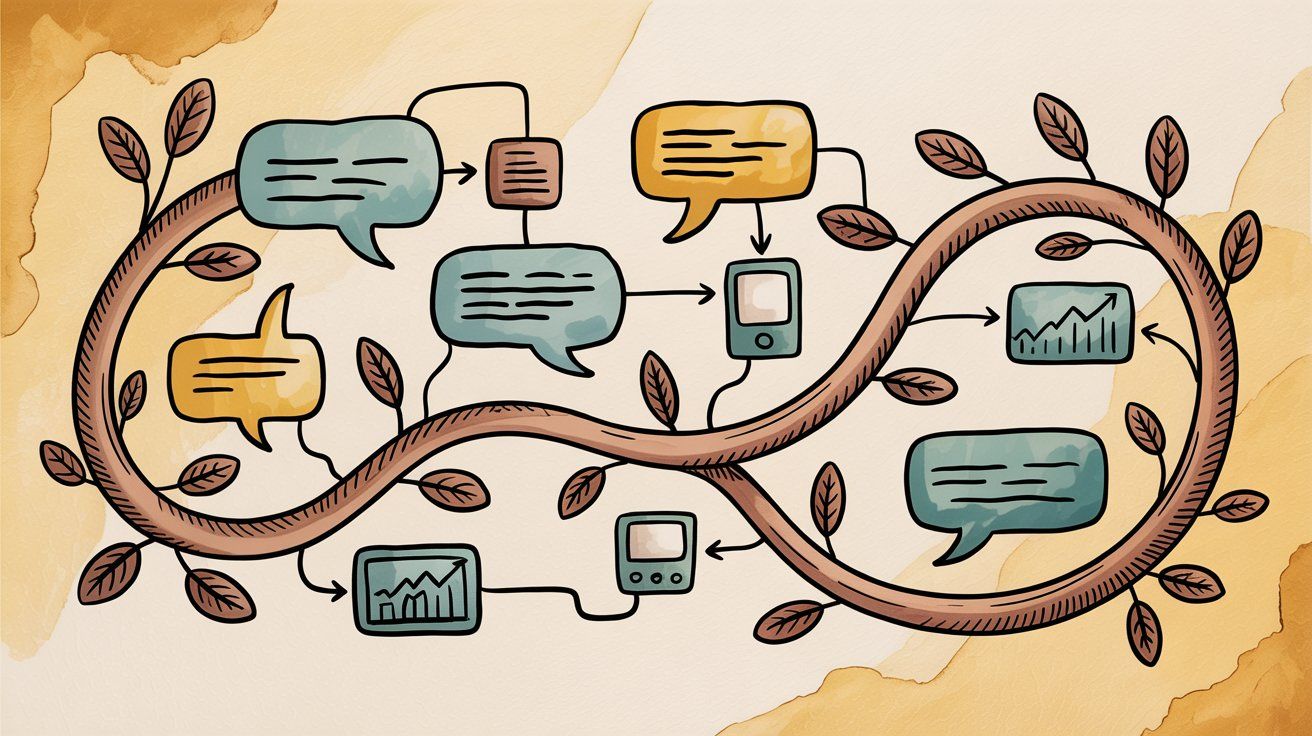
Spur's visual automation builder lets you create these flows without code. Set triggers like "customer's last order was 30 days ago" to start a re-engagement sequence.
This proactive outreach keeps your brand top-of-mind without manual effort.
CRM Integration Magic
Connect WhatsApp to your e-commerce platform for killer use cases like abandoned cart recovery.
When someone abandons their cart, WhatsApp sends an automatic reminder an hour later with cart items and a nudge: "Still thinking it over? Here's free shipping on your pending order: [checkout link]"
Many Indian brands recover significant revenue this way. Similar automations work for:
• Reorder reminders for consumables ("It's been a month since you bought protein powder (ready for a refill?")
• Cross-sell prompts ("Thanks for buying a printer! Need ink cartridges? 10% off: [link]")
• Upselling based on purchase history
These personalized automations boost lifetime value with minimal manual work.
AI-Powered Personalization at Scale
Newer AI can analyze browsing/purchase patterns and generate tailored recommendations for each user. Instead of manual segmentation into dozens of groups, AI decides the best message for each person.
This "personalization by AI" makes mass messaging feel genuinely one-to-one.
Human Handoff (When It Matters)
Automation augments humans, it doesn't replace them. If a bot can't handle a query or the user requests human help, seamlessly transfer to a live agent.
WhatsApp marketing sparks conversations (that's the goal!). Be ready to respond promptly when needed. A shared team inbox (like Spur provides) lets your team collaborate with full conversation history.
The winning combo: AI handles repetitive work, humans handle complex interactions. That balance prevents your team from burning out while delivering excellent service.
Let's look at proven WhatsApp marketing use cases across Indian businesses:
Flash Sales & Broadcast Promotions
The classic approach: blast about a sale, new product, or event. WhatsApp's immediacy makes it perfect for limited-time offers.
Example: "⭐ 48-Hour Diwali Mega Sale! ⭐ Everything 30% off. Use code DIWALI at checkout. Valid till midnight tomorrow. [Tap to shop]"
Indian consumers love deals and share them with friends and family. Make your messages share-friendly.
VIP "Insider" Alerts
Give WhatsApp subscribers first access to new launches. Share preview links before email or social media, maybe with a bonus: "Pre-book on WhatsApp and get a free gift."
Your WhatsApp audience is warmer. Treat them like VIPs.
Abandoned Cart Recovery
When someone leaves items in their cart, send a helpful WhatsApp reminder (not pushy).
"You left something in your cart (need help? These items are almost sold out: [list items]. Complete your order here: [link]. We're here if you have questions!"
That conversational tone (and offer of help) prompts users to ask questions if something held them back (size, price, etc.). Your team addresses it in chat, boom (conversion).
Transactional Messages with Subtle Upsells
Shipping confirmations and delivery updates have near-100% open rates. Sneak in relevant value:
"Glad your order arrived! Hope you love it. If you have questions, just message us. BTW, we've added 200 reward points to your account. Redeem on your next purchase (our new collection just dropped 🙂"
Keep the primary info front and center. Make any promo concise and relevant.
Interactive Quizzes or Surveys
Run a quiz or survey for engagement and data gathering. A food delivery app could send a "What's Your Pizza Personality?" quiz via WhatsApp, asking quick questions with answer buttons, then recommending a pizza with a discount code.
Or a fitness coach runs a weekly poll: "Have you worked out this week? 👍=Yes, 😞=Not yet" then follows up accordingly.
Interactive campaigns make your audience feel involved, not sold to. Plus, responses give you business intelligence gold.
Support That Becomes Marketing
In India, word of mouth is massive. Delight one customer, they'll tell five others. WhatsApp support is your chance to create advocates.
After resolving an issue, send: "Happy to help! If you enjoyed our service, could you give us a quick rating?" with a thumbs-up/down or review link.
Positive WhatsApp interactions build loyalty. A satisfied customer who just had their problem solved might be receptive to gentle cross-sells: "Glad we sorted that out. By the way, we have a new accessory that complements your product (I can send details if interested!"
If you're looking for a platform that makes WhatsApp marketing simple, powerful, and profitable, Spur is purpose-built for exactly that.
Unlike generic chatbot tools, Spur is a multi-channel AI messaging platform specifically designed for WhatsApp Business API, Instagram DM automation, and Live Chat. It's built for D2C brands and service businesses in India who need to scale customer conversations without losing the personal touch.
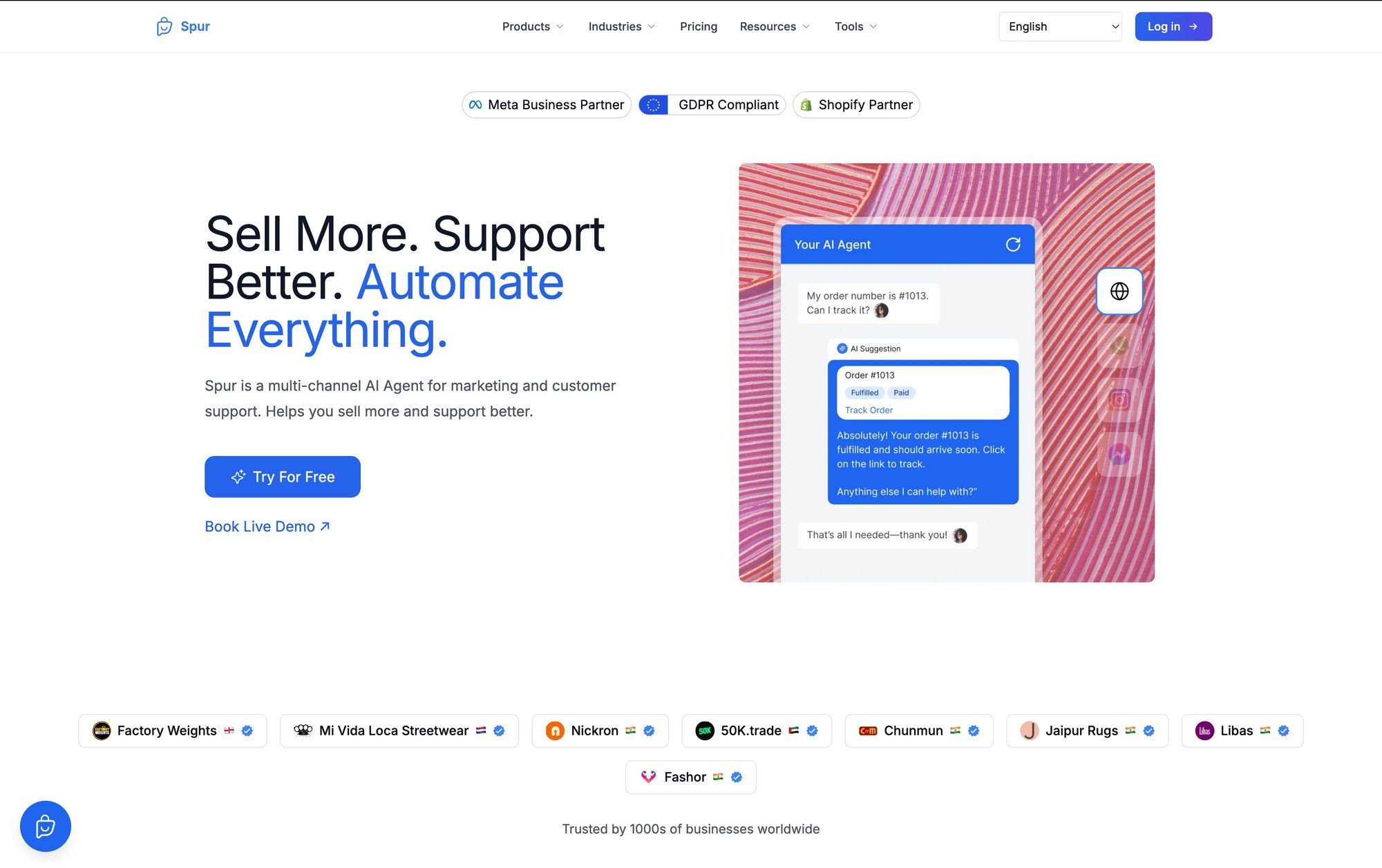
Key Differentiators:
Capability | Spur | Competitors |
|---|---|---|
Actionable AI Agents | ✅ Trained on your knowledge base, can track orders, book appointments, update records | ❌ Most offer basic Q&A bots only |
Knowledge Base Training | ✅ Train AI on your own data and website content | ❌ Many competitors don't support this |
Marketing Automation | ✅ Full WhatsApp, IG, FB automation | ❌ Some lack marketing features |
User-Friendly | ✅ Visual builder, no coding needed | ❌ Some require technical knowledge |
Multi-Channel Unified Inbox | ✅ WhatsApp, IG, FB, Live Chat in one dashboard | ❌ Most focus on single channels |
1. AI Agents That Actually Do Things
Spur's actionable AI isn't just a chatbot answering FAQs. It's an intelligent agent that can:
• Look up order status in real-time
• Update customer records in your CRM
• Book appointments or meetings
• Process refunds or exchanges
• Make product recommendations based on browsing history
This is fundamentally different from static FAQ bots. Spur's AI takes action, which means customers get solutions without waiting for human intervention.
2. Visual Automation Builder (No Code Required)
Build complex conversation flows visually. Drag and drop to create:
• Welcome sequences for new subscribers
• Abandoned cart recovery flows
• Post-purchase engagement campaigns
• Re-activation sequences for dormant customers
Spur's flow builder uses triggers (like "30 days since last order") to automatically start conversations, keeping your brand engaged with customers at exactly the right moments.
3. Deep E-Commerce Integrations
Spur integrates seamlessly with Shopify, WooCommerce, Razorpay, Stripe, and logistics platforms like Shiprocket.
This means:
• Automatic order confirmation messages
• Real-time shipping updates
• Abandoned cart recovery (with product images and checkout links)
• Reorder reminders for repeat purchases
• Personalized product recommendations
Your entire customer journey runs on autopilot while feeling completely personal.
4. Broadcast & Campaign Management
Send targeted WhatsApp broadcasts to thousands of segmented contacts. Spur's DeliveryBoost feature optimizes message routing to improve deliverability rates.
Create segments based on:
• Purchase history
• Engagement level
• Cart abandonment
• Geographic location
• Product interests
Then send hyper-relevant campaigns that actually convert.
5. Multi-Channel Unified Inbox
Manage WhatsApp, Instagram DMs, Facebook Messenger, and Live Chat from one dashboard. Your team can:
• See full conversation history across channels
• Assign conversations to specific agents
• Use quick replies and templates
• Track response times and resolution rates
• Collaborate with internal notes
Spur's shared inbox ensures no customer message gets lost, and your team stays coordinated.
6. Instagram Automation (Official Meta Partner)
Spur's Instagram automation captures leads from comments, story mentions, and DMs. The platform is an official Meta partner, meaning:
• Auto-reply to comments and DMs
• Story reaction automation
• Comment-to-DM flows (move engagement private)
• Lead qualification via Instagram chats
For Indian brands heavy on Instagram marketing, this transforms lead generation completely.
The proof is in the performance. Here are actual results from brands using Spur:
→ 73x ROI on WhatsApp Broadcast
An Indian D2C brand sent a targeted WhatsApp promotion via Spur and achieved 73x return on investment. They used carousel messages and DeliveryBoost to maximize delivery and engagement.
→ 35% Conversation-to-Purchase Rate
A pet care startup used Spur's personalization features to send tailored product recommendations. Result: 35% of all WhatsApp conversations led to purchases, generating ₹1 million in 3 months.
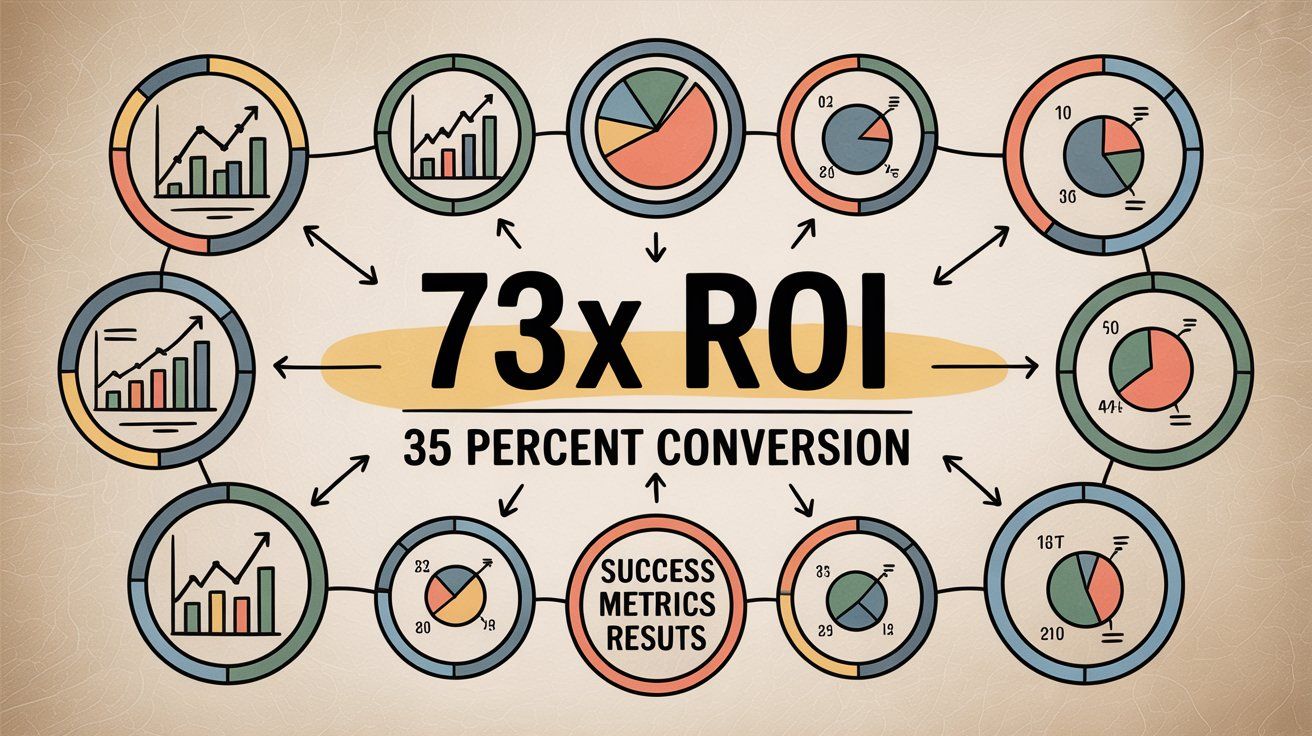
→ ₹50,000+ Monthly Savings
A baby products brand automated order tracking and FAQs with Spur's AI, saving ₹50,000+ per month in support costs while maintaining better customer experience.
Spur offers flexible pricing plans for businesses of all sizes, starting from entry-level tiers perfect for growing brands.
The platform includes:
• 7-day free trial to test everything
• AI agent with knowledge base training
• WhatsApp Business API access
• Visual automation builder
• Multi-channel inbox
• E-commerce integrations
• Analytics and reporting
• Priority support on higher tiers
Plus, Spur handles all the technical complexity of WhatsApp API setup, Meta verification, and template approvals (so you can focus on marketing strategy, not infrastructure).
Ready to transform your customer engagement? Start your free trial with Spur and see why Indian businesses are achieving 73x ROI on WhatsApp marketing.
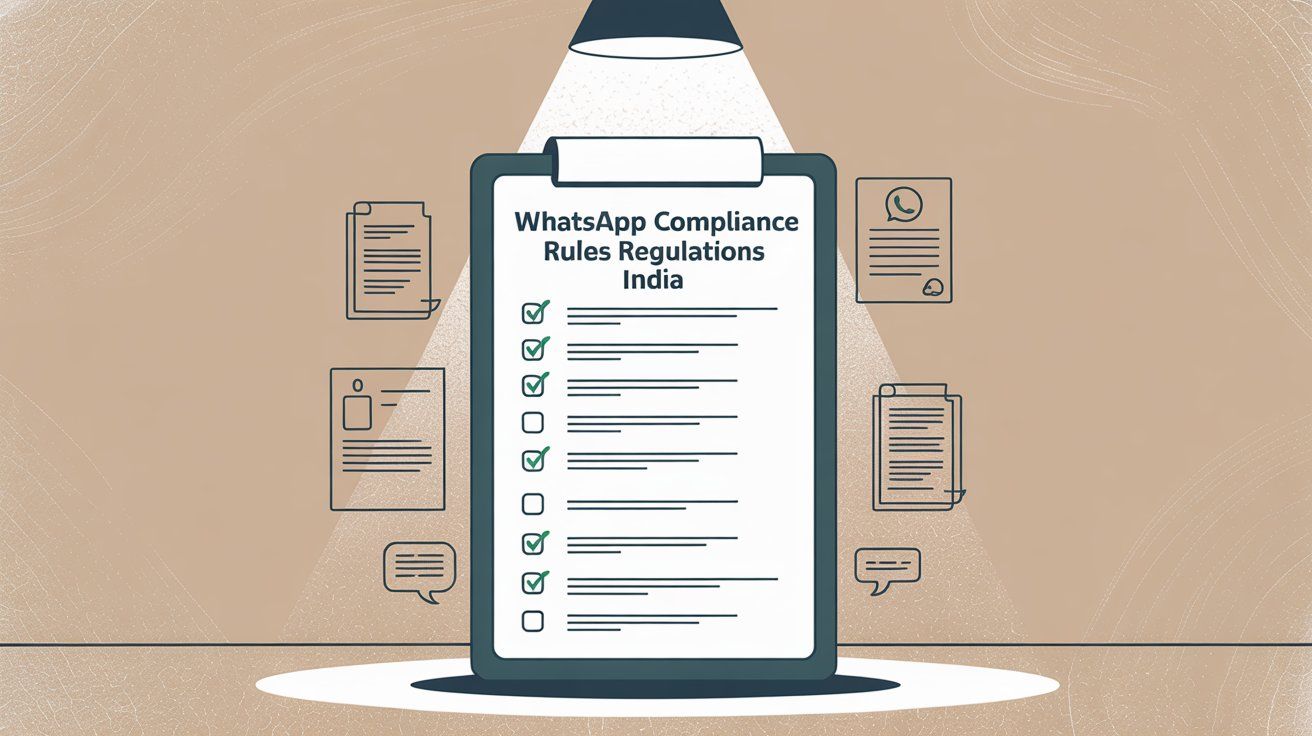
Success on WhatsApp requires respecting both the platform and your audience. Here are the non-negotiables:
Quick Compliance Checklist:
Rule | Why It Matters | How to Follow |
|---|---|---|
Explicit Consent | Avoid spam flags & blocks | Only message opted-in users |
Template Approval | Required for marketing messages | Submit clear, valuable templates to WhatsApp |
Easy Opt-Out | Legal requirement & good practice | Respond to "STOP" immediately |
Reasonable Frequency | Prevents user fatigue | 1-4 promotional messages/month max |
Timing Respect | Cultural sensitivity matters | Send 9 AM - 9 PM local time only |
Data Privacy | DPDP Act 2023 compliance | Secure storage, transparent usage |
Only message users who've agreed to be contacted on WhatsApp. An unsolicited message feels as intrusive as a telemarketing call.
If someone initiates chat or signs up through your channels, you have implied consent to reply. But if you got a phone number elsewhere (third-party list, unrelated purpose), do not message them without clear opt-in.
WhatsApp monitors feedback signals (blocks, reports). Too many complaints can get your template or number blocked.
WhatsApp prohibits certain content: illegal products, adult material, gambling offers, real money gaming in India, predatory loan offers.
Most legitimate businesses won't hit these restrictions. But know the rules, especially if your content is sensitive. You also can't send certain personal data (credit card numbers, passwords) over WhatsApp.
Violations hurt your account quality rating. Deterioration leads to sending limits or bans.
For API users, messages outside the 24-hour response window need pre-approved templates. When creating marketing templates, be clear and valuable.
❌ Vague or clickbait gets rejected: "You won't believe these deals!!! Click now!"
✅ Straightforward works: "{name}, our Big Billion Sale is live! Enjoy up to 50% off on gadgets until {date}. Don't miss out: {shortlink}"
Don't try hiding marketing content in utility templates. Meta's smart at categorizing, and mismatches get flagged.
Just because someone opted in doesn't mean daily messages are okay. Over-messaging leads to opt-outs or blocks, hurting your number's reputation.
Good cadence for promotional messages: 1-4 broadcasts per month, depending on your brand and content quality.
For daily updates (news, tips), consider WhatsApp Channels rather than blasting everyone's inbox.
Always ask: "Is this message genuinely useful to my customers?" If not, don't send it.
Highly targeted, segmented messages (campaign only to lapsed customers, or users who showed interest in a category) perform better than generic blasts.
Let people stop receiving messages if they want. If users feel trapped, they'll block you (which is worse).
Instruct users: "Reply STOP to unsubscribe." If someone does that or asks not to be messaged, honor it immediately.
Spur can handle opt-out keywords automatically and suppress those contacts from future sends.
If a user hasn't engaged in a long time, consider reducing messages or removing them. Dormancy signals disinterest.
Send marketing messages at reasonable hours (9 AM to 9 PM local time). A blast at 6 AM or midnight will irritate people.
Respect festivals or sensitive periods. Avoid overly salesy messages during major holidays unless it's relevant.
If someone replies to your campaign, respond within a couple hours max. Consumers treat WhatsApp like live chat (silence diminishes trust). If you can't guarantee quick human responses off-hours, ensure your bot acknowledges them and queues for next day.
Customer data from WhatsApp must be stored and used securely. While chats are end-to-end encrypted, once data reaches your system (number, orders, transcripts), you must protect it.
India's data protection law (DPDP Act 2023) requires safeguarding personal data and using it only for consented purposes.
Be transparent in your privacy policy about WhatsApp usage and data collection. Avoid sharing sensitive personal details over chat (for identity verification, ask for partial info instead of full ID numbers).
Track delivery rates, read rates, response rates. A drop in delivery or increase in blocks signals issues (poor content, wrong targeting).
Many providers show a quality rating for your WhatsApp number (monitor it closely).
Solicit feedback: "Are our WhatsApp updates useful? What would you like to see more of?"
Train support agents to note common feedback. If many customers say "too many messages" or "not relevant," adjust your strategy.
WhatsApp evolves quickly. New capabilities like WhatsApp Flows, Commerce, and Payments are rolling out.
In-app shopping carts and payment integration could let customers browse and pay entirely within WhatsApp. Early adoption gives competitive edge.
Stay tuned to official announcements or check Spur's blog for updates on new features.
Use a reliable WhatsApp Business Solution Provider (BSP). They provide tools for easy compliance and serve as a buffer to ensure you follow WhatsApp's terms.
Spur is an official WhatsApp partner with experience guiding businesses to success. They offer templates, best practice guides, and support for template rejections, number quality issues, and technical integration.
When evaluating platforms, look for:
• Broadcast capability
• Chatbot builder
• Integration options (Shopify, CRM)
• Analytics
• Good support
• Transparent pricing
Many small retailers (boutique fashion stores in Mumbai to electronics shops in Nehru Place) use WhatsApp Catalog to showcase products instead of building e-commerce sites.
They upload product images, prices, descriptions into their WhatsApp Business profile. Customers browse this catalog and directly message to order or inquire.
A Mumbai boutique saw sales jump after posting new arrival collections in their WhatsApp status and catalog. Loyal customers would reply to reserve items.
Some brands have run WhatsApp Live Sales (sending a series of status updates or broadcasts showcasing items one by one, letting users claim them by messaging). The immediacy creates a QVC-like shopping vibe.
Jewelry brands have sold out designs in minutes through WhatsApp live drops.
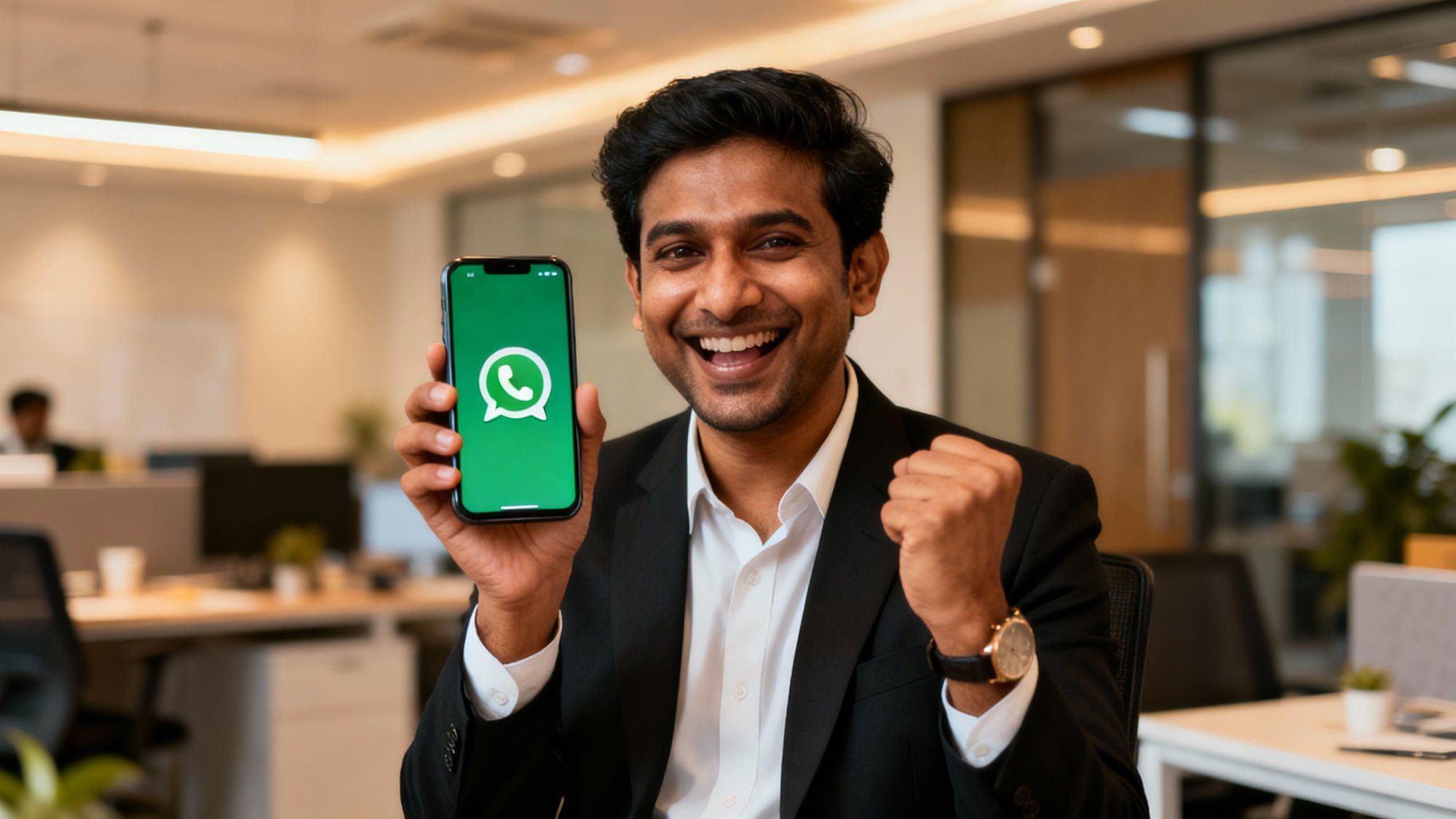
Key Takeaway: Personalization, speed, and convenience are king. WhatsApp allows you to personalize at scale, respond at lightning speed, and make buying as convenient as a few taps.
WhatsApp's role in marketing will only expand, driven by new features and evolving consumer behavior. Watch these trends in 2025 and beyond:
The line between chatting and shopping will blur. WhatsApp Flows and Commerce features allow mini-app experiences inside a chat.
Users could fill forms, choose items, and complete purchases entirely within WhatsApp without visiting a website. In India, WhatsApp Pay (UPI-based) is already live. Expect deeper integration where customers pay merchants in-chat after browsing catalogs.
Imagine ordering pizza or renewing subscriptions with a few WhatsApp prompts and a UPI PIN entry.
Businesses adopting these flows will reduce friction dramatically and improve conversion rates.
Chatbots will become more intelligent and human-like. With advancements from OpenAI and Meta's AI, bots will handle increasingly complex inquiries.
AI is getting better at understanding what customers actually want, even in Hinglish or local dialects.
Small businesses will get access to sophisticated AI via platforms, leveling the customer service playing field.
Marketers will leverage WhatsApp alongside data platforms for micro-targeted campaigns. Instead of "all customers in Mumbai," segments become "customers in Mumbai who bought sports shoes and haven't purchased in 3 months."
As more customer data platforms (CDPs) integrate with WhatsApp, you'll orchestrate journeys spanning channels. If a user doesn't open an email, the system triggers a WhatsApp message the next day.
Marketing becomes omnichannel with WhatsApp as a central pillar.
Increased use brings increased scrutiny. Users and regulators will watch privacy and spam closely. India's regulators might introduce specific messaging rules (analogous to SMS regulation under TRAI's DLT system).
If you're following best practices (consent, clear identification, easy opt-out), you'll be compliant.
Features like Verified Business badges (Blue Tick) will become more valuable. That badge improves open rates and user confidence. Consider applying through your provider if you're a notable brand.
Expect more engaging formats. WhatsApp already introduced carousel messages (multiple scrollable images with links/buttons).
The future might bring mini-games or AR try-ons via WhatsApp (imagine virtually placing furniture in your room through WhatsApp AR).
Video content will dominate more (short video promotions or explainers). With cheap data and fast networks in India, marketers should produce snackable video content (vertical, sound-off friendly, attention-grabbing in first 3 seconds).
Also, leveraging WhatsApp Status (Stories-like feature) may become standard. Currently underutilized, but it's free exposure to your audience.
India is phygital (physical + digital). Expect more integration of offline activities with WhatsApp.
Visit a store and receive a WhatsApp thank-you with a coupon as you exit (via beacon or QR scan). Event attendees join a WhatsApp group/bot for live info and contests.
With QR codes and NFC tags triggering WhatsApp chats, offline brand interactions seamlessly continue online for ongoing engagement.
The future of WhatsApp marketing in India: Deeper integration with commerce, AI, data, and the broader customer journey. WhatsApp could become not just a messaging app but a full platform for acquisition, transactions, and retention.
Yes, WhatsApp marketing is completely legal in India, provided you follow proper consent and compliance rules.
Key requirements:
• Obtain explicit user consent before messaging them
• Follow WhatsApp's Commerce Policy (no prohibited content)
• Comply with India's data protection laws (DPDP Act 2023)
• Use approved message templates for promotional content
• Provide easy opt-out options
The golden rule: Treat it like permission-based email marketing but with stricter rules. Never buy contact lists or spam users.
Costs depend on your platform and message volume. Here's the breakdown:
Cost Component | Amount | Details |
|---|---|---|
Platform Fee | ₹3,000+/month | API providers like Spur charge subscription fees |
Marketing Messages | ~₹1.4 per conversation | |
Service Messages | Often FREE | Customer-initiated chats on most plans |
Example calculation: Sending 1,000 marketing messages = ~₹1,400 in conversation charges + your monthly platform fee. Given the high conversion rates (remember that 73x ROI?), costs are typically justified easily.
WhatsApp Business App:
• Free mobile app for very small businesses
• Manual operation, one user/phone
• Broadcast limit of 256 contacts
• No automation or integrations
• Best for local shops doing manual outreach
WhatsApp Business API:
• For medium-large businesses or serious marketing
• Accessed via platforms like Spur
• Unlimited broadcasts with approved templates
• Full automation, chatbots, multi-agent access
• Integrates with CRM, e-commerce, analytics
• Costs involved but unlocks true marketing power
For any serious marketing (campaigns, automation, scale), you need the API.
Build your subscriber list through:
Website opt-in forms - Offer incentive like discount for joining
Click-to-WhatsApp ads - Instant engagement on Facebook/Instagram
Social media links - Put in bio/posts (Instagram, Facebook, YouTube)
QR codes - Easy offline-to-online in stores, packaging, flyers
Checkout opt-in - Simple checkbox during purchase/sign-up
Always be transparent about what they'll receive and how often. Offering value (exclusive deals, helpful updates) increases opt-in rates.
Yes, but with rules. For WhatsApp API users:
• Promotional messages require pre-approved message templates
• Templates must be categorized as "Marketing" when submitted
• Messages can only go to users who've consented
• You pay WhatsApp's marketing conversation rate (₹1.4 per conversation in India)
• Users can opt-out anytime
Promotional content must add value and not be spammy. Follow template guidelines to ensure approval.
Highest-performing messages typically:
① Personalized - Use name, purchase history, preferences
② Visual - Include product images, videos, or GIFs
③ Conversational - Friendly tone, not corporate speak
④ Actionable - Clear CTA like "Shop now" or "Ask a question"
⑤ Time-sensitive - Limited offers create urgency
⑥ Interactive - Quick-reply buttons, list menus
Pro tip: Messages in Hinglish or local languages often resonate better with regional audiences. Test different approaches and track what works for your audience.
Use platforms like Spur that offer:
Smart automation:
• AI chatbots trained on your knowledge base (contextual responses)
• Drip campaigns triggered by user behavior
• Dynamic content insertion (name, location, product preferences)
• Segmented broadcasts (different messages for different audiences)
Human handoff:
• Seamlessly transfer complex queries to live agents
• Shared inbox with conversation history
• Quick replies and templates for common responses
The key is using automation for repetitive tasks while keeping human agents available for nuanced interactions. AI handles routine, humans handle relationship-building.
Track these metrics:
Engagement metrics:
• Message delivery rate
• Read/open rate (typically 90-98%)
• Response rate
• Click-through rate on links
Conversion metrics:
• Conversation-to-purchase rate
• Revenue generated per campaign
• Abandoned cart recovery rate
• Average order value from WhatsApp customers
Efficiency metrics:
• Cost per conversation
• Customer acquisition cost
• Support ticket reduction (if using automation)
• Time saved via automation
Platforms like Spur provide built-in analytics dashboards tracking all these metrics. Compare revenue generated to platform costs + message charges to calculate ROI.
Absolutely (this is actually recommended). The same WhatsApp number and platform can handle:
Support:
• Order tracking and updates
• Product questions and FAQs
• Returns and exchanges
• Technical assistance
Marketing:
• Promotional broadcasts
• Product recommendations
• Exclusive offers
Spur's unified inbox manages both seamlessly. Tag and categorize conversations as "support" or "sales" to route them appropriately. The dual approach actually works better (support builds trust that makes marketing more effective).
Main risks to avoid:
• Spamming: Too many messages or messages without consent can get your number blocked
• Policy violations: Prohibited content or template misuse can result in bans
• Poor user experience: Slow responses or irrelevant messages damage brand reputation
• Data privacy issues: Mishandling customer data violates DPDP Act 2023
• Over-automation: Fully automated responses without human backup frustrate customers
Mitigate risks by:
• Following all consent and compliance rules
• Using a trusted platform like Spur
• Monitoring quality ratings and feedback
• Training team on WhatsApp best practices
• Providing easy opt-out options
Done right, WhatsApp marketing is low-risk and high-reward.
WhatsApp has woven itself into the fabric of daily life in India. With 600 million+ users and open rates touching 90-98%, no other channel offers this combination of reach and engagement.
WhatsApp marketing in India isn't about spamming inboxes. It's about starting conversations. Being there for customers with timely information, helpful responses, and the occasional irresistible offer.
Key takeaways:
→ Massive reach: 83% penetration of India's messaging market means your customers are already there
→ Right tools: Use WhatsApp Business API via platforms like Spur for broadcasts, automation, and integrations
→ Smart strategy: Build opted-in audiences, craft personal messages, use rich media, automate intelligently
→ Proven results: Indian brands achieve 73x ROI, 35% conversation-to-purchase rates, and ₹50,000+ monthly savings
→ Future-ready: New features like in-chat commerce, AI conversations, and payment integration will only increase WhatsApp's power
Spur makes implementing these strategies simple. With visual flow builders, AI agents trained on your knowledge base, e-commerce integrations, and multi-channel management, you can focus on strategy while the platform handles technical complexity.
The competitive advantage goes to those who act now. Your customers are waiting on the other side of that green chat bubble.
Ready to transform your customer engagement and drive real revenue? Start your free 7-day trial with Spur and discover why WhatsApp marketing is becoming the cornerstone of how Indian businesses grow.
Your next 73x ROI campaign is just a message away. 👋
